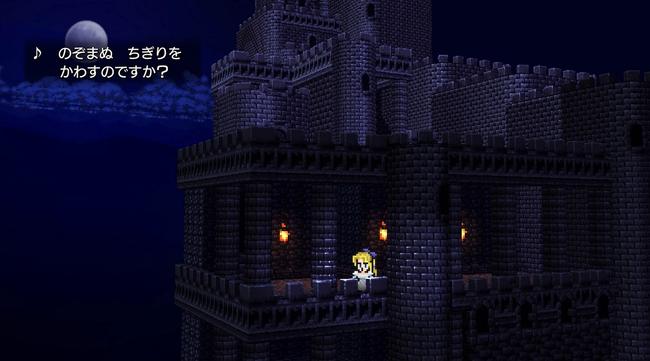
Nobuo Uematsu explains Final Fantasy VI Pixel Remaster’s new Opera vocals
Final Fantasy VI Pixel Remaster is out now, and the release does make one major change to this absolutely classic game - seriously jazzing up the game’s famous opera sequence, both with a new 2D-HD presentation that some of us were a little unsure about as well as something else that certainly wouldn’t have been possible on the SNES - real-life singing.
While the FF6 Pixel Remaster isn’t voice acted and still features the same text box presentation, characters do obtain a voice briefly in this sequence - with Celes singing the now-classic lyrics through actors. Square Enix pulled out all the stops, with voice recordings for this sequence completed in seven different languages.
In a new video to promote the game, original FF6 composer and game music legend Nobuo Uematsu reflected on the creation of the Opera alongside FF6 director Yoshinori Kitase. The pair discussed the origin of the Opera’s lyrics, and also some of the thinking behind its voice casting today. We’ve translated some of his comments.
“In the original version it didn’t have vocals, so I thought it would be nice if we could actually put vocals in there,” Uematsu explains of the Opera in the FF6 Pixel Remaster. “I thought it would be impossible or difficult.
“So I tried asking Square Enix: How about we actually have someone sing here? With several languages on top of that: Korean, Spanish, American (English), German, Italian, so everyone could enjoy it. I said that half-jokingly, I just thought it would be nice if that could be implemented, but when I checked it again, they actually implemented all of those languages.”
The person to ensure Uematsu’s wishes got implemented? Original FF6 co-director Yoshinori Kitase, of course.
“The producer came to me and asked 'Uematsu said this, what should I do?',” Kitase gleefully explained. “So I replied 'You should listen and do everything that Uematsu said.' I was the key figure behind the scenes!”
Uematsu describes his emotional response to hearing the song performed in different languages for the first time. The Opera, of course, has become a staple of live performances in Final Fantasy concerts around the world - but these have typically only been performed in Japanese or English. Here, Uematsu got to hear his work in even more languages.
“They sent me data from a total of 7 languages: Japanese, English, Spanish, Italian, German, French, & Korean,” Uematsu reveals. “No matter what language it was, even when I couldn't understand [the language], I still couldn't help getting overflowed with tears. The world has around 7.7 billion people - I don't know the exact number, but I'm thinking how people all around the world share the same feelings on a single entertainment title, and that really made me tear up.”
“So I really think: Why do wars happen? Why can't people just unite under fun things like this? When I had those tears, I definitely thought that doing this [multi language song] is the correct way. Thank you Square Enix for doing it, I'm really moved by that,” Uematsu concludes, in a statement that rings particularly true on the week of FF6 Pixel Remaster’s release, as parts of the world stand again on the brink of war.

One thing fans have noticed about the Pixel Remaster version of the Opera, however, is that the vocal performance isn’t as operatic as in other live versions of the song, such as those recorded as part of the Distant Worlds: Music of Final Fantasy concerts. While it’s an opera, it clearly isn’t being performed by an opera singer. But, Uematsu reveals, that is all deliberate, and it’s based on the story of how the scene comes to pass in FF6. .
“The Draco opera song was supposed to be sung by an opera singer, but Celes would suddenly appear on the stage,” Uematsu says, referring to how Celes and the FF6 cast end up accidentally caught up in the play performance.
“If [Celes] could actually sing real opera, that would be a lie,” Uematsu explains, going on to laugh that technically, everything in FF6’s story is a lie, what with it being fictional and all.
“So we had the fixation to intentionally choose someone whose vocals didn't seem like an opera singer, but more like a musical singer,” Uematsu concludes. It’s as simple as that.
And what of those lyrics? Well, they were written for the original FF6 - but it turns out they weren’t written by Uematsu, but by Kitase - and they hold a personal story and meaning. Uematsu points out that Kitase wrote the lyrics, which he downplays, saying he wrote them “more like in-game text than song lyrics.”
But, Uematsu reveals, Kitase channeled his real-life experience when writing the operatic love poem.
“It didn't turn out to be a love song, but instead a love letter for the woman he was dating. But he wasn't lying, he did end up marrying her and they had a baby,” he reveals, speaking of Kitase’s family.
“I was young back then,” Kitase laughs.
Final Fantasy VI Pixel Remaster is out now for PC and mobile.